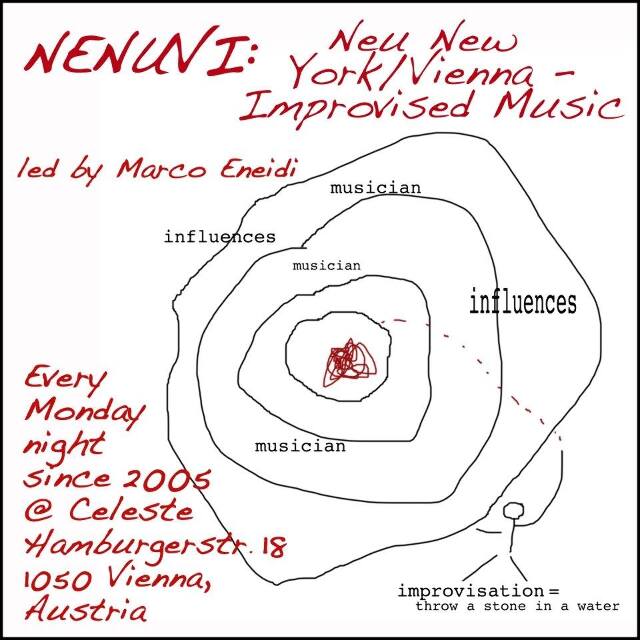General Text
The Celeste is a small venue in the fifth district of Vienna located between the U4 metro stations Kettenbrückengasse and Pilgramgasse. You can find the entrance, a very inconspicuous doorway, at Hamburgerstrasse 18 right next to the famous Rüdigerhof. For over 35 years it has been an important location for the cultural scene, hosting concerts, club nights, occasional film screenings and other events with a big diversity in genres ranging from local indie pop to experimental electronics and free improvisation. The space is structured in two bigger rooms and a garden. The first room has a small stage and area for the audience with chairs and tables that turns into the dancefloor on the weekends. The other room has a bar and couches. There is another room in the cellar that is open occasionally, but is currently under construction, this was the location where in 2005, american jazz musician Marco Eneidi founded the “Neu New York, Vienna Institute of Improvised Music” and started hosting sessions of improvised music every week, always on mondays. This event established itself as one of the most important places for improvised music in Vienna (even Austria) and is still active today, although hosted by different people. When he hosted, Eneidi was starting the night with him playing and then opening up the stage for others to come. As the host he would usually select the people that would play the next session, seemingly randomly. His session would often go on until late in the night and became a well-known spot beyond Austria that traveling musicians would often come to visit. From 2014, after Marco Eneidi moved back to America, the institution of Neu New York changed into Monday Improvisers Sessions organized by three established musicians from the local scene, Susanna Gartmayer, Didi Kern & Thomas Berghammer, who take turns in hosting the sessions each week. Today, it is a place and an event series in Vienna that has been going around for 19 years consecutively. The sessions are now being hosted in the room with a stage and audience with seating. The selected host for the week greets you at the entrance and asks whether you are going to play or not. If you are, you tell the host your name and your instrument and/or noise maker tool of choice. The improvisers can use any tool including their voices to contribute to the stage. The host takes notes and writes your name and your instrument on a list. Then the event starts with a preselected set of musicians that go on stage and play for the amount of time they wish to play. After they finish their sessions, the host calls their selection of improvisers on stage by their names. The selected ones go on to the stage, meet each other, and start playing, also until they do not want to continue. The event usually goes on until around 23:00, often with a last session where everyone who wants can join in. The place, Celeste, and this event series Monday Improvisers Session are directed for a very specific audience and does this job well. The events are often filled with people that either come to play or to listen to the players. When the players are on stage, whomever left becomes the audience and listens to the improvisers. The stage is being respected as a magic circle in this ludic space and activity. And this creates a flow between players and the audience, for the audience will become a player and the players will become the audience on the next sets. The music played at the Improviser’s Session could be roughly classified under the term “free improvisation”. Guitarist Derek Bailey, in his 1980 book “Improvisation - Its Nature and Practice in Music” writes about free improvisation that “diversity is its most consistent characteristic. It has no stylistic or idiomatic commitment. It has no prescribed idiomatic sound. The characteristics of freely improvised music are established only by the sonicmusical identity of the person or persons playing it”. These characteristics can be easily observed at every session in Celeste, indeed, the austro-american ethnomusicologist Tom Zlabinger, in his dissertation on the history of jazz and improvisation in Vienna, suggests that “[...] when improvisation [at Celeste] begins, musicians tend not to claim the music as their own and “dig in”. There is a certain lightness or distance to the process. There are exceptions of course, but usually the freely improvised moments in jazz and improvised music in Vienna are not “owned” by the musicians. Rather, the moment comes and goes.” The idea behind this space and the playing of improvisational music is for many participants simply the feeling of “freedom” they have when they are “playing” with the instruments, the music, the noises. Most of them said after they had met other players here, a lot of new associations emerged from this ludic meeting. There are a lot of players that have had the habit of coming here every monday since a very long time. According to the hosts, many of them had even been coming regularly since the very beginning of the event series. In recent years the sessions have also started becoming more popular with a younger generation of musicians, contributing to the big diversity of people in the community. From the looks of it, the Monday Improvisers Session at Celeste will continue to be the hub for improvised music in Vienna and a cornerstone of the Austrian music scene for an even longer time. References: Derek, Bailey. "Improvisation: its nature and practice in music/Derek Bailey. Оriginally published Ashborune.–England: Moorland Pub. In association with Incus Recordc, 1980." BIBLIOGRAFIYA 1: 2. Zlabinger, Thomas Albert. Free from jazz: The jazz and improvised music scene in Vienna after Ossiach (1971-2011). City University of New York, 2013.


